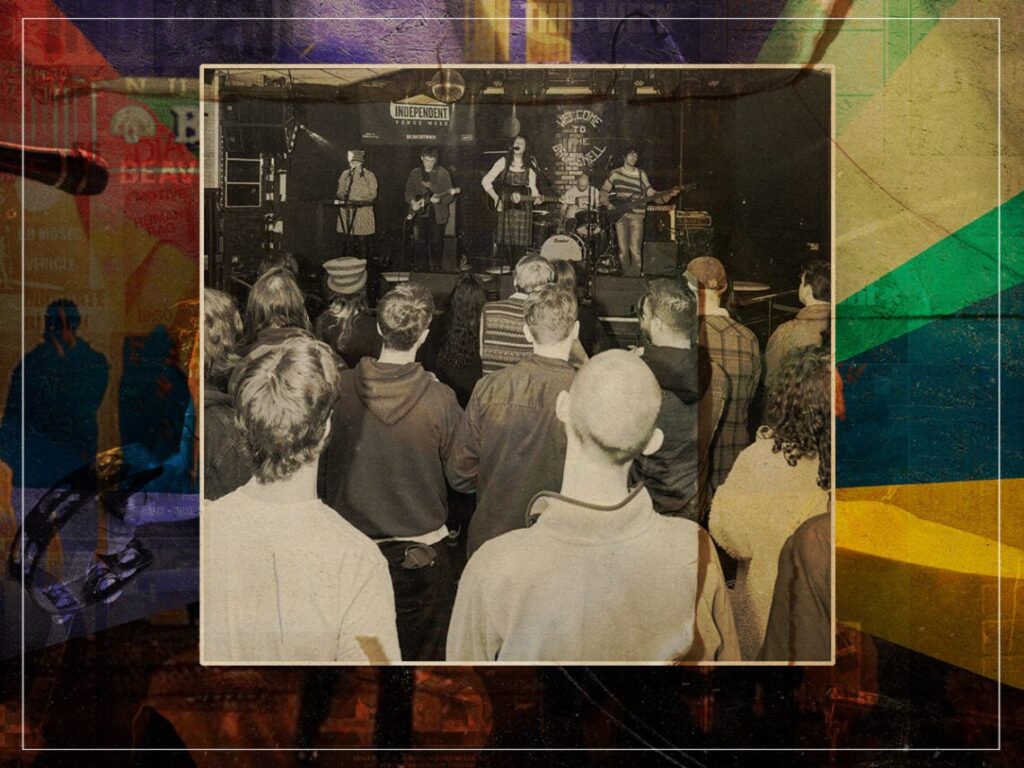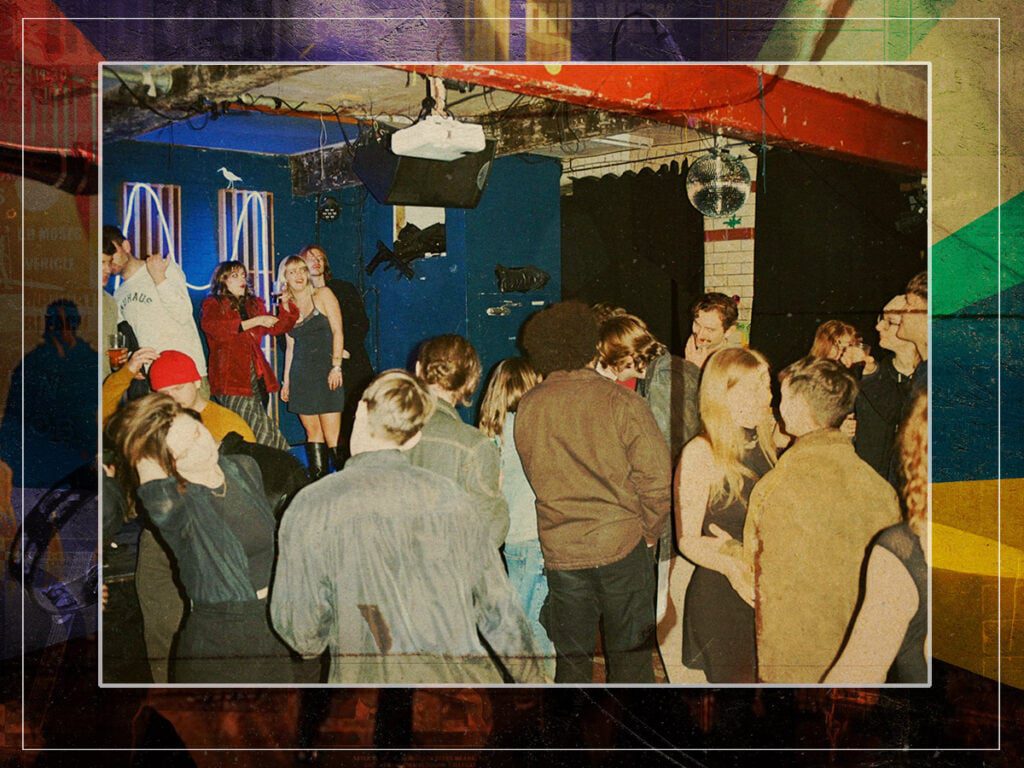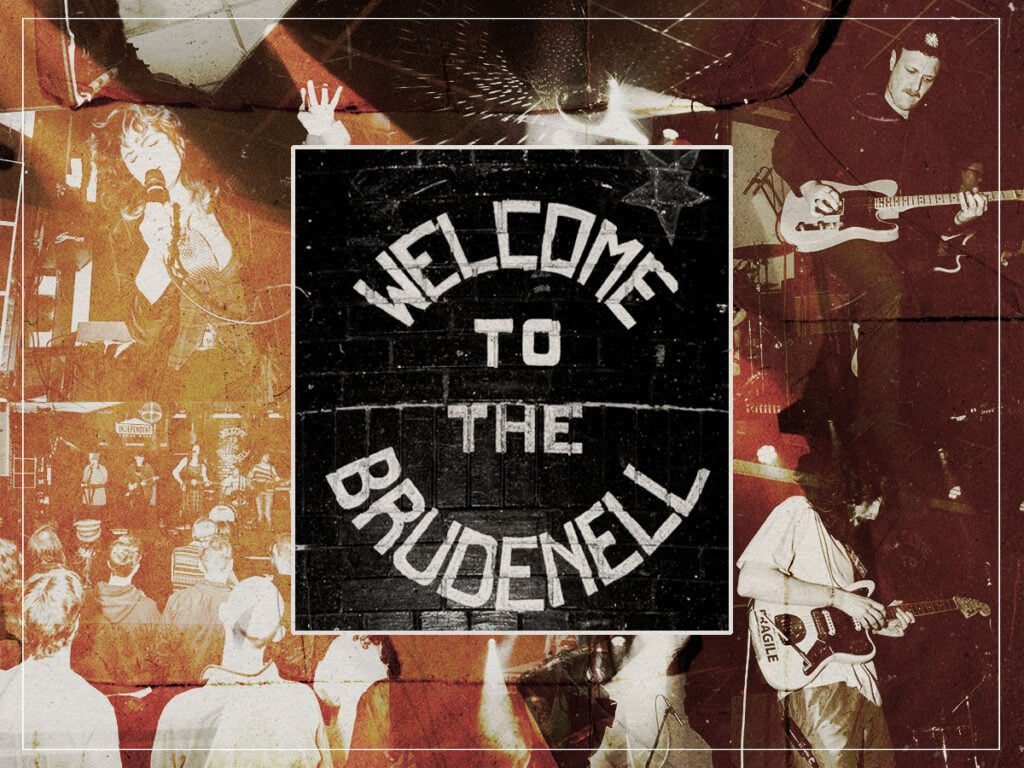The independent venues keeping the Leeds DIY music scene alive
 Posted On
Posted On
(Credits: Far Out / Tom White)
Leeds has always been a thriving musical city, even if larger places like London or Manchester have often threatened to overshadow its brilliance. It all truly kicked off in the late 1970s when Leeds gave birth to some rather iconic post-punk acts like Gang of Four, the Mekons and Delta 5. From there, the city hasn’t been able to shake its post-punk roots, and in the decades since, there has been an abundance of bands attempting to capture the glory of these acts—some succeeding considerably more than others.
That’s just a tiny sample of the city’s musical offerings, of course. Scenes ranging from dub to hardcore punk and gothic rock have found homes in Leeds in the years that have followed. Leeds has always championed its independent venues, which have supported scenes big and small, giving bands the chance to collaborate, hone their sound and build a fanbase. In fact, this very publication, Far Out Magazine, was first founded in the city many years ago.
While some venues have closed down due to a lack of funding – a problem facing many nationwide venues, particularly during the current cost of living crisis – the city has also seen more and more indie venues establish themselves over the years, nurturing bands of all sizes. This is perhaps due to various indie venues utilising innovative business models, such as transforming into rehearsal spaces during the day, allowing these spaces to thrive as creative hubs. That’s not to say it’s simply that easy, but in a landscape that feels as though strong musical scenes are dwindling, Leeds seems to be leading the way with its multi-purpose venues.
Beyond the realms of Leeds Festival and venues like the 02 Academy and First Direct Arena, every corner of the city is crammed with DIY spaces that have made the underground music scene the best in the north – and one that is only getting bigger and better by the day. The vibrant offering of indie venues is currently allowing a variety of genres to thrive, such as post-punk, experimental composition, noise rock, folk, and everything in between.
From Wharf Chambers and Mabgate Bleach to Brudenell Social Club and Hyde Park Book Club, the city’s independent venues happen to be some of the most popular, especially for those with more alternative tastes. Even on a chilly day, the picnic tables outside of HPBC are rammed, and the basement is usually lined with eager music fans when a gig is on. Visit Wharf Chambers on any evening, and you’ll usually be in for a surprise – an experimental music night, a punk gig, a drag performance. Still, the overflow of people into the car park-turned-beer-garden is always constant and unchanging.

The venue is one of the cornerstones of the current Leeds independent scene, hosting local bands and performers several times a week. It requires a membership (albeit an affordable one), and as a result, there is a natural feeling of community at Wharf, where the gender-inclusive toilets are plastered with years worth of posters advertising the strangest and most enticing events you can think of.
Wharf Chambers was established in 2011 following the closure of another inclusive venue, Common Place. “We wanted to continue the legacy of the space as a place for politics and music, but also to improve on it with a more sustainable model,” a spokesperson from the venue told me. “As a worker co-op we were able to ensure that the people doing the work made the decisions while also being paid a fair wage”.
With a radical lending library, frequent social mixers, and a safeguarding officer often on hand at events to ensure that everyone is having a great time, Wharf is the perfect place for people to come together without fear of judgment. As a result, regular experimental music nights, LGBTQ-themed DJs, local bands and established stars frequently grace the stage, a place of innovation and unadulterated creative expression. “We try to keep things both cheap and interesting, which isn’t always an easy balance to strike,” Wharf claims. Just recently, they welcomed Princess Superstar to the stage, who performed her viral hit ‘Perfect’ to a packed-out audience.
“I think the value of venues goes far beyond what will make a record label some money. We try to foster an enriching atmosphere of inclusivity and experimentation, recognising that culture and socialising are deeply intertwined. You can’t buy that”. Wharf clearly have the right idea; they offer a welcoming and positive environment for everyone, regardless of their identity, which is incredibly refreshing in such a white, male-dominated musical landscape. The venue seems to encourage people who might not have otherwise had the confidence to try something new, whether that be performance art or playing in a chaotic punk band.
Walk 20 minutes across the city, and you’ll arrive at another space that is a favourite among the Leeds music scene: Mabgate Bleach. It’s one of those unassuming venues that a lot of people might not know exists if they don’t frequent DIY gigs in the area, partly because it’s tucked away in an old textile mill. With just three toilets, a tiny bar inside the main space, and a few benches scattered outside (if you’re lucky), the venue might not seem like a thriving hub for alternative music, but the space has seen everyone from local acts to wider-known bands take to the stage. This “intimate setting allows for memorable and personal performances,” the venue told me.
They continued: “The primary motivation behind its creation [in 2017] was to provide a dedicated space for the grassroots community of musicians in Leeds that we were part of.”
Mabgate Bleach added: “We wanted a venue where local artists could perform and thrive, and the live events and private party/event-space rental we host also help fund the rent of the venue as well as the rehearsal and recording studios connected to it. Things have always been tight, but our goal has always been to support our local music scene by offering an inviting platform for both emerging and established artists.”

The venue emphasises the importance of fostering a space where people can experiment and meet like-minded people. Mabgate Bleach believes that, because of the “increased accessibility of music in general through digital platforms,” there is “a growing need for physical spaces where musicians can develop their craft and connect with audiences in a different, more tangible way”. One of Leeds’ most beloved bands, the noise rockers Thank, echoed this in an interview with Far Out. Frontman Freddy Vinehill-Cliffe told me, “Those kinds of [DIY] venues are such a part of our DNA as a band.” Without these sweaty, intimate spaces, bands wouldn’t be able to discover their sounds and what works best in a live setting or build connections within the scene.
Of course, these aren’t the only DIY venues keeping the Leeds music scene alive and well. Not too far from Mabgate Bleach is Boom, which caters towards those with heavier tastes, and also fairly nearby is The Wardrobe, a venue that has hosted some incredibly successful artists like Amy Winehouse. Down Call Lane, gig-goers can find venues like Oporto and Northern Guitars, which, alongside The Wardrobe, partake in musical celebrations like Independent Venue Week and Live at Leeds.
Then there’s Brudenell Social Club, the most popular of all. While people gather at the venue for pints and pies every day, its two stages have hosted some massive artists, ranging from Tom Jones to Father John Misty and The Fall. The venue frequently puts on accessible day festivals to promote some of the city’s greatest new offerings, as well as free gigs to allow anyone and everyone a chance to immerse themselves in live music.
Earlier this year, the Brudenell held Back to Back Festival, which cost just a few quid for two days’ worth of music. “It’s important for everyone to be able to consume culture, regardless of their background,” Sammy Robinson from Brudenell Presents told Far Out in February. “It’s incredibly important to support your local community” because “that’s who helps independent venues survive, and local artists are a massive part of those communities,” he noted.
Thanks to venues like Brudenell Social Club, Mabgate Bleach, and Wharf Chambers, Leeds musicians and music lovers have found places where community and accessibility prevail, subsequently allowing musical innovation and celebration to prosper. These venues are promising examples of what happens when you create spaces that are truly inclusive, utilising savvy business models—like renting out the space as a practice studio or using an affordable membership system—that allow for accessible events that foster a space for all.
[embedded content]
Related Topics


